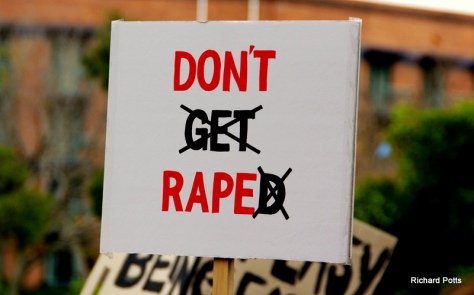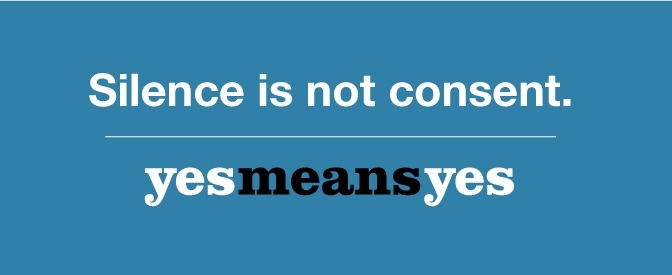As we have read and heard from the media, sexual assault has now been recognized as a big problem on college campuses. Potential victims are told how they should avoid assault, but potential assailants have no responsibility to avoid committing the assault. For us to have a safe campus, this needs to change.
In addition to victim-blaming, universities have a history of poorly handling these cases.
In fact, UC Berkley and UCLA are currently under investigation by the federal government for alleged violation of Title IX. Title IX is a law which prohibits students from being subjected to a hostile environment on the basis of gender.
This year, UC Davis reported 24 sexual assaults committed, a 33% increase from the 18 reported in 2012. The number of sexual assault reports are “still shockingly low,” according to Sofie Karasek, a senior at UC Berkeley who helped prepare the complaint against the University for being in violation of Title IX. “The reporting process is still not good enough.” These reports do not reflect what is actually happening on campus. There are 33,000 students on the UC Davis campus. According to a Justice Department report, 1 in 4 female college students experience rape or attempted rape before graduation. Clearly, there cannot be only 24 people out 33,000 being sexually assaulted. With about 240,000 students attending UC campuses, the system’s rate of reported sexual assaults last year was about 1 per 1,200 students. That would equate to about 1 sexual assault report per 240 students over the course of five years.
But we are starting to see a change. We now have three new campaigns to combat sexual assault, one on the UC level, the California level and the federal level. These new, progressive campaigns each take a different approach to prevention, awareness and justice of sexual crimes.
UConsent
UC campuses will be joining the University of California Student Association’s (UCSA) new campaign “UConsent.” While this is a UC-wide campaign, UConsent will be tailored to the needs of each individual UC school. Because UC Davis has a very distinct environment than, say, UCSB, our needs and focuses are going to be much different. Unlike many campaigns in the past, UConsent is not going to use the “one-size-fits-all” model.
The goals of UConsent is to promote survivor support, inform student their rights and resources, and even go as far as to reform the sexual assault reporting process. According to Keven Sabo, UCSA’s board chair, “the language around sexual assault is one of victim blaming. The campaign is a step in the direction of advocating a culture of affirmative consent and ensuring that students do not feel intimidated by the process of filing a sexual-assault complaint.”
“Yes Means Yes”
California just made a landmark achievement with the passing of “Yes Means Yes.” “Yes Means Yes” is a new campus rape prevention law that improves the older, flawed model of consent, “No Means No.” The conversation about rape has shifted from that model of consent to one of prevention, justice and healing. The old “no means no” adage is no longer enough to protect women against unwanted sexual encounters.
This new legislation requires UC’s and CSU’s to add an affirmative consent clause to their sexual assault policies. This means that both parties must give clear consent before sexual activity begins. Clarity also means that lack of resistance or silence does not mean “yes.” “Yes Means Yes” also includes another law: consent can be revoked at any time during the activity.
This law is very important to people who experience date rape or attempted date rape. Studies have shown that victims don’t feel comfortable reacting, reporting, or even fighting back when the attacker is someone they know.
“It’s on US”
Obama’s new federal-wide campaign, “It’s on US,” serves to educate and empower bystanders to take action before an assault occurs. This campaigns asks its participants to take a pledge:
To recognize that non-consensual sex is sexual assault.
To identify situations in which sexual assault may occur.
To intervene in situations where consent has not or cannot be given.
To create an environment in which sexual assault is unacceptable and survivors are supported.
In 2013, New Zealand’s government released a 8-minute long PSA about how bystanders can be instrumental in preventing sexual assault. This campaign is called “Who are You.” New Zealand has funded “Who are You” with the belief that offenders are most often known to the victim, and the events leading up to the assault are often witnessed by others. This means that if a potential assault can be witnessed, the assault can be prevented.
The Bottom Line
I feel that our generation is seeing a change in how rape and its victims are addressed. We are finally engaged in a national discussion about rape. It is no longer shameful for the victim to discuss her pain. In fact, some people choose to make their assaults public in order to promote change. Emma Sulkowicz, a Senior at Columbia University, is using performance art as a way to draw people into the discussion. She is dragging the mattress she was raped upon all around campus in order to engage people in the conversation. And it worked. People are now talking about student safety, and legislation has passed in order to find new, productive ways of addressing the issue.
However, even more can be done. Instead of just placing the responsibility on the bystander or the school, how about putting it on the perpetrators? We need to figure out an effective way to teach potential assailants not to rape. How about a “Better Safe than Sorry” attitude. If a student feels that their date is drunk and can’t even find their way home, they should wait to engage in sexual activities another time, when their date isn’t mentally impaired. Anti-rape classes should be a requirement in universities. There are too many victims to not mandate this class. If 1 in 4 students get assaulted before they graduate, that means there are around 4,000 girls that will be raped and endure attempted rape at their college of choice.




